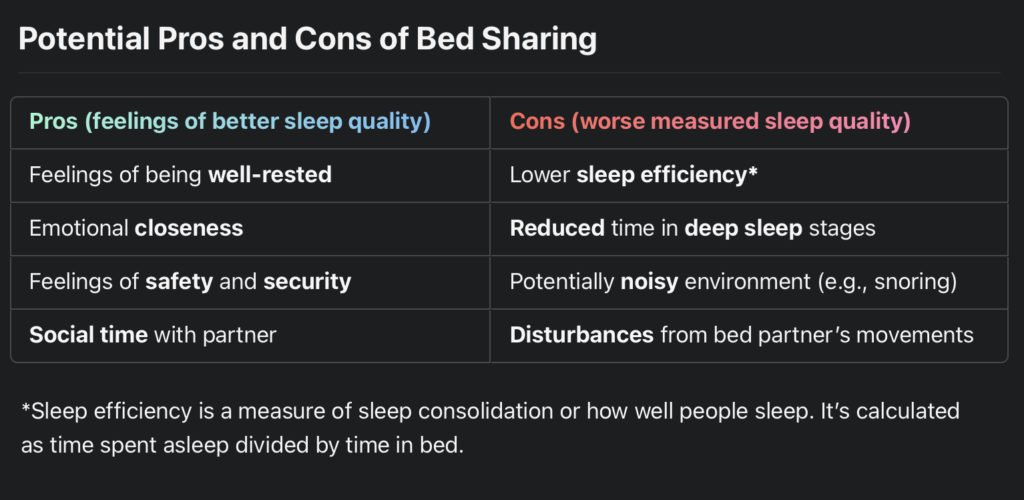Co-sleep with partners and pets is good in some cases, but not others
Sleeping with another being, whether it be another human or a pet, is one of the most intimate experiences that we share. Sleep puts us in an incredibly vulnerable state, leaving us open to being harmed. Thus, sleeping in the same space with someone else is often an unstated act of trust. We know that there is the possibility that others could harm us when we sleep, but with a bed partner, we expect to be protected in the face of external danger. Most adults share their bed with either a partner, pet, child, or combination of the three. Does it make sense for us to do things this way? How could bed sharing impact our sleep quality and our emotional well-being? Are there benefits to sleeping alone?
The pros and cons of bed sharing with a romantic partner
Although the research on bed sharing and couple sleep is in its infancy, some studies suggest that sleeping with a romantic partner is linked with higher reports of better sleep quality. In other words, people feel like they’ve slept better when they sleep with a partner. This is almost always the case. However, with objective reports of sleep quality, using wrist-worn monitors or brain-based measurements, the research is mixed. Some studies suggest that sharing a bed with a partner disrupts sleep and shortens restorative sleep stages, while others find that sleep consolidation is better with a bed partner. For a quick summary of the pros and cons, see the table below.
People might report better sleep when with a partner for several reasons, but they most likely involve emotional well-being and feelings of security. One study has shown that women who sleep with a partner and experience depression sleep better than women with depression who sleep alone. The emotional closeness of bed sharing may facilitate better sleep. People also feel more safe when they sleep with someone else as compared to sleeping alone. In fact, married partners often report feeling anxiety and poorer sleep on nights when they don’t share a bed with their partner (e.g., when one partner is traveling).
Differing from people feeling as if they’ve slept better with a partner, objective measurements of sleep quality during co-sleep are sometimes worse than when sleeping alone. One study that was based on 14 couples found that people wake up more during the night with a partner as compared to sleeping alone. A similar study found the opposite result. People who slept in the same bed as their partner woke up less during the night. However, this study was based on just 4 couples and should be replicated with more people.
There are many reasons that bed sharing may interfere with sleep. One of the most studied reasons is snoring. A research study found that women who sleep with men who snore sleep worse while sharing a bed with them than when they sleep alone. Sleep may also be disrupted if the partner wakes up during the night and the awakening is “transferred” to the bed partner. Thus, sleeping with someone who is a poor sleeper could be problematic for someone who typically sleeps well when alone.
Should you sleep with your pet in the bed?

Questionnaires have shown that most people who have pets sleep with their pets in the bed or the bedroom. Very few pet parents report that their pets are disruptive to their sleep quality. Those who do report problematic pet behaviors during sleep typically involve movement and noise. Pets who wander around the bed/bedroom, who snore, or whimper, while the caretaker is sleeping may be disruptive. For example, if a pet is noisy and likes to play at night (like my cat sometimes does…), you may need to remove him from the bedroom. You might also consider playing with him more often during the day so that he is less playful (more tired) at night.
However, most people don’t report that their pets are disruptive. They mention feeling a sense of safety and security when their pets sleep in the same bed. There are qualitative (i.e., descriptive) reports of pets being described as “soothing” while in bed. These emotional benefits from bed sharing with a pet may reduce pre-sleep arousal, or feelings of cognitive or physical excitement before bed, and help pet parents to fall asleep more easily and stay asleep throughout the night. However, more research is needed in this area to pinpoint the exact nature of how pets may be beneficial to sleep.
It is important to note that sharing the bed with a pet does not guarantee better sleep. Researchers have set specific recommendations for whether pets should be allowed in the bed during your sleep time or not. The recommendations are primarily based on three criteria. First, is the pet noisy in a way that is disruptive to your sleep? Second, is there enough space in the bed for you and your pet to sleep comfortably? Third, does the pet help you to calm down before bed? If the answer to the first two questions is no and the third is yes, having your pet in the bed may be facilitative to your sleep, instead of disruptive. On the other hand, if your fur child is disruptive to your sleep, he may need to sleep elsewhere. As a caretaker of a spoiled, stubborn (but sweet) cat, I understand the difficulty of getting a pet to sleep in a different area. Making a sleep space for your pet that is more attractive to him than the bed may be helpful. Taken together, the pros and cons for sleeping with a pet are largely the same as for sleeping with a partner. The table summarization for the pros and cons of bed sharing applies to both human and pets.
High quality sleep should not be sacrificed to bed sharing
Sleep is a restorative process. We need to sleep well to think clearly, function properly, and manage our emotions. Sleeping with a partner, whether it be a romantic partner or pet, should not be placed above obtaining high quality sleep. However, I don’t think that means that we must sleep alone to sleep well. But we do need to pay attention to the things in our environments that may affect our sleep, and if there are things that negatively impact our sleep quality, they should be addressed. For example, if a partner’s snoring wakes you up at night, you may want to talk with her about it and see if there are any underlying health issues that should be discussed with a health professional. Alternatively, you could mask the sound of the snoring with ear plugs or a white noise machine. Noise from pets could be handled in the same way. In any case, things that affect your sleep should be managed and restructured as is appropriate. We should be proactive in trying to sleep well, even when that requires making changes that involve others.
NOTE: An important limitation to consider is that the current research has been largely limited to heterosexual couples. More research should be dedicated to investigating sleep patterns in LGBTQ+ couples. Previous studies have consistently shown that people in the LGB community sleep more poorly than heterosexual people, which warrants the need for more research involving couples with more diverse sexual orientations.

Hi there! I know this is kinda off topic but I’d figured I’d ask.
Would you be interested in trading links or maybe guest authoring a blog article or vice-versa?
My site goes over a lot of the same subjects as
yours and I feel we could greatly benefit from each other.
If you happen to be interested feel free to send me an e-mail.
I look forward to hearing from you! Great blog by the way!
Hi, thanks for your comment! That sounds like a cool idea. I’m happy to learn more about your blog. Feel free to email me about it and let me know what collaboration ideas you have in mind.